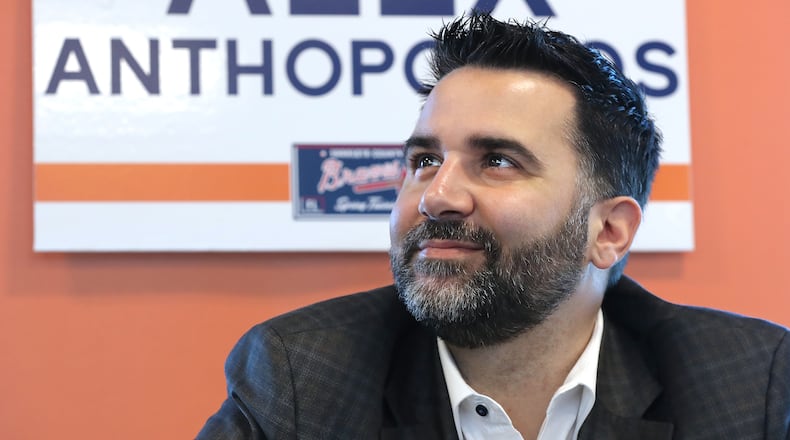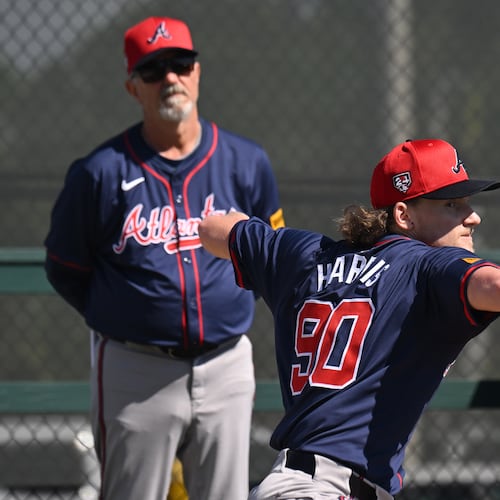LAS VEGAS – In baseball, this time of year is about reading the tea leaves and attempting to discern which way the wind is blowing.
Teams – some of them, at least – attempt to move in silence. Agents try to find the best deals and fits for those they represent. Everyone has an agenda.
There is always a lot to discuss, even if Braves president of baseball operations Alex Anthopoulos, by his own admission, never touches on specifics about free agency. There are plenty of storylines surrounding the Braves this offseason. (Yes, there are more topics past Dansby Swanson’s free agency).
Here are five things we learned from this year’s General Manager Meetings:
It’s about the price for the Braves and Swanson
This seems obvious, but here’s what it means: At this point, we’re simply waiting to see whether the Braves will meet Swanson’s asking price.
It’s become clear Swanson and the Braves would like to continue their partnership. They’ve both said so publicly.
So, then, why have the Braves not re-signed Swanson?
It’s all about the price. If Swanson commands more than the Braves are comfortable giving him, then, well, they’ll probably let him walk. Under Anthopoulos, the Braves have done a nice job of recognizing their limits and pivoting if needed.
“Any time you have a great player who’s a free agent, those guys are hard to sign because they earned it,” Anthopoulos said. “They’ve put themselves in a really good position with great play. You’re happy as a club because they’re a big part of winning.”
Anthopoulos on Wednesday declined to reveal whether he had contacted Swanson’s representatives recently. The sides talked about a potential contract extension during the second half of the season, as The Atlanta Journal-Constitution reported around that time, but they now find themselves here.
Swanson now is allowed to sign with another team. The Braves would receive a draft pick if that occurred because they extended the one-year, $19.65 million qualifying offer to Swanson before Thursday’s deadline.
It still seems like the Braves re-signing Swanson is the likeliest scenario. It makes a lot of sense. He’s an unofficial captain of the club. He has continued to improve as a shortstop. He almost certainly will come at a lower cost than Trea Turner, Carlos Correa and Xander Bogaerts.
Maybe the Braves prefer Turner, Correa or Bogaerts. Specifically, Bogaerts might not earn much more than Swanson, and perhaps the Braves want to go that route. Anthopoulos is an expert at not tipping his hand.
But the Braves and Swanson have both expressed a desire to get a new deal done. If that’s true, we’re simply waiting to see whether they match up in negotiations.
The layers to the Braves trading for Kolby Allard
On the surface, you might have viewed the Braves trading for Kolby Allard as something relatively simple.
There are layers to it.
The Braves on Wednesday acquired Allard, their first-round pick in 2015, from the Rangers. Atlanta sent Jake Odorizzi and $10 million in return.
Odorizzi had exercised his $12.5 million option, so you take that minus the $10 million the Braves sent the Rangers and that means Atlanta saved $2.5 million, right?
That’s oversimplifying it. It’s more complicated.
Let’s go back to this summer’s trade deadline, when the Braves dealt Will Smith to the Astros for Odorizzi.
Smith made $13 million in 2022, while Odorizzi had a base salary of $5 million. The Braves saved some money just by unloading Smith.
When they acquired Odorizzi, the Braves knew he had a $6.25 million buyout if he declined the player option for 2023. They had a check ready because they expected him to opt out considering he would’ve needed only to earn a one-year deal worth $6.25 million on the open market to make up the difference in the buyout and his player option (which would make opting out worth it).
Are you following this?
The Braves saw the cost of their trade as $3.75 million – because they sent Texas $10 million after they were prepared to pay Odorizzi’s $6.25 million buyout regardless.
With $3.75 million in general, for example, the Braves could’ve acquired a veteran fifth starter, someone like Odorizzi. But Allard gives them much more upside, in different ways.
They know Allard well. His strikeout numbers are respectable. He has minor-league options, which gives the Braves more flexibility in using him as depth. (Last season, the Braves used 12 different starting pitchers). Allard will make the minimum salary for another year before reaching arbitration.
The Braves essentially bought a prospect in Allard.
And in trading Odorizzi, he is off the books. Odorizzi’s $6.25 million buyout would have counted toward the 2022 payroll.
Three catchers?
In 2021, seven Braves catchers received at-bats.
“I’m kind of scarred by it,” Anthopoulos said. “I don’t know that I want to live through that again. It was really hard.”
If looking only at what Anthopoulos said publicly at the GM Meetings, it seems like the Braves could carry three catchers in 2023. It may appear as if they have a surplus with Manny Piña – who missed almost all of 2022 after season-ending wrist surgery – expected to be a full go in spring training.
But Anthopoulos has seen catching depth disappear.
And the Braves loved Piña when they signed him to a two-year, $8 million deal, with a $4 million club option for 2024, last offseason.
“If we weren’t signing him, we weren’t signing anybody else,” Anthopoulos said. “It was a player-specific thing we were going to look to do.”
Piña could be traded – anything can happen – but the Braves seem to think catching depth is a strength. Especially because William Contreras, a young catcher, can be the Braves’ designated hitter. It’s not as if the Braves will carry three defensive catchers.
The Braves, Anthopoulos said, rely on their catchers for much more than what happens on the field. They are involved in game preparation.
“We love the framing, we love the bat, the defense, the game-calling,” Anthopoulos said of Piña. “He’s a tremendous teammate.”
Soroka is part of the fifth-starter competition
Mike Soroka is attempting to come back from tearing his Achilles tendon twice. Fans, and the Braves, are rooting for him.
He’ll be part of a loaded fifth-starter competition, assuming Anthopoulos doesn’t acquire or sign a starting pitcher who’s better than Soroka and those with which he’ll compete this spring.
But what do the Braves have in Soroka now?
“That’s why you have camp,” Anthopoulos said. “Come in, you compete in spring.”
Last season, Soroka’s rehab assignment began in High Single-A. He made one start there before making five Triple-A starts. In those five outings, he posted a 6.43 ERA that might have been inflated by a bad outing.
It seems too soon to tell whether he’ll return as the Mike Soroka who burst on to the scene during a sensational rookie season.
“That’s why these guys have options, and we can just take the best guy,” Anthopoulos said of the fifth-starter candidates. “You know that you’re going to need all of them over the course of six months.
“But you go in and these guys will have options and are competing, and we get to take the best guy any time of the year, which is great for the club.”
Ian Anderson, Kyle Muller, Bryce Elder and Allard will be some of the others competing for the job.
How the rule changes will, or will not, affect the Braves’ thinking
Kenley Jansen, an established closer, often pitches at a slow tempo. He takes his time, focusing on each pitch and each batter in some of the game’s most crucial moments.
But there is a pitch clock coming in 2023. Jansen is a free agent. Would the Braves factor in that pitch clock?
“All I know is he was awesome for us, and he’s going to the Hall of Fame, in my opinion,” Anthopoulos said. “And I bet on that guy every day of the week.”
Along with the pitch clock, MLB restricted shifts and will use bigger bases. Those changes will alter the game.
But by how much?
No one knows yet.
The Braves aren’t sure how they’ll factor in those changes when considering free agents and trade candidates.
“I just think we don’t know,” Anthopoulos said. “But we’ll talk about it, we’ll look at it. We can’t make definitive statements. We can have general ideas, thoughts, this and that. I do think, like, with data information, good players are good players, right? And they’re going to adjust. So we’ll look at it, we’ll talk about it. I don’t think it’s going to drive anything that we do.”
About the Author
Keep Reading
The Latest
Featured



